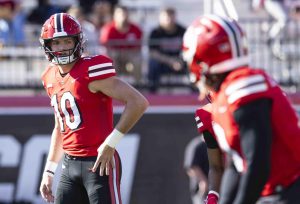Forum paves way for WKU’s academic future
March 29, 2011
An open forum Friday in the Downing University Center Theater conducted by Gordon Emslie, provost and vice president for Academic Affairs, and Gordon Baylis, vice president for Research, aimed to seek input from faculty and staff about WKU’s academic future.
The forum discussed results of the listening tour conducted last fall by Emslie and Baylis.
The two made recommendations for the division of Academic Affairs to foster a better future for WKU.
“We want to provide you with the flexibility to use your talents to move the university forward,” Emslie said.
The five key areas discussed were overarching goals and strategies, budgeting strategies, faculty workload and incentives, enhancing research and creative activity, and reorganization, according to agenda materials provided at the forum.
“There were some things that I thought were positive signs of the future and other things that I questioned why they’re doing it,” said Kelly Madole, psychology professor and University Senate chair.
Patti Minter, associate history professor and faculty regent, said the forum presented detailed information and provoked many questions.
“That’s a lot of information to disseminate late in the afternoon on Friday,” Minter said. “I’m looking forward to the opportunity to talk some more about it on the follow-up.”
One of the recommendations was a reorganization of the office of the provost.
Richard Miller, associate vice president for Academic Affairs, will become vice provost.
The heads of Enrollment Management, Academic Budgets and Administration, Planning and Program Development, Extended Learning and Outreach, and Academic Enrichment and Effectiveness will all become associate vice presidents for their divisions.
“I think people do wonder why we need to promote so many people who are already assistant vice presidents,” Minter said.
Minter said she was also confused about the workload models.
Emslie said the idea workload for a faculty member would be 60 percent teaching, 20 percent citizenship and 20 percent research.
“When the provost and the VP for research say that these are models out there to allow departments to do what they need to do, I think faculty appreciate that,” she said. “There seem to be a lot of expectations that offer the promise to help us do our jobs, but if there’s not funding to make it possible, it won’t really mean much.”
Minter also said one of the recommendations is to promote a “three and three” teaching load. “Three and three” means that professors would teach three courses per semester, without additional funding to instructors, instead of, for example, four courses one semester and three the next (“four and three”).
She said she doesn’t think this could be possible, partly because faculty members don’t have enough time outside of classroom duties to conduct research.
Emslie invited attendants to come to a second open forum on April 22 at 3 p.m. in the Mass Media and Technology Hall Auditorium.
He wants faculty and staff to have time for in-depth thought about the recommendations so there can be informed discussion at the next forum.
“One thing that I think that’s got to be loud and clear is we know some people see administrators as people who say, ‘Thou shalt not,’” Baylis said. “We’re absolutely not saying that. We’re saying, ‘Thou mayest if thou wouldest.’”












